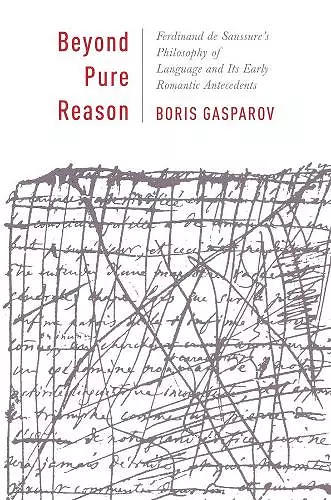Beyond Pure Reason
Ferdinand de Saussure's Philosophy of Language and Its Early Romantic Antecedents
Format:Hardback
Publisher:Columbia University Press
Published:2nd Oct '12
Currently unavailable, and unfortunately no date known when it will be back

The Swiss linguist Ferdinand de Saussure (1857-1913) revolutionized the study of language, signs, and discourse in the twentieth century. He successfully reconstructed the proto-Indo-European vowel system, advanced a conception of language as a system of arbitrary signs made meaningful through kinetic interrelationships, and developed a theory of the anagram so profound it gave rise to poststructural literary criticism. The roots of these disparate, even contradictory achievements lie in the thought of Early German Romanticism, which Saussure consulted for its insight into the nature of meaning and discourse. Conducting the first comprehensive analysis of Saussure's intellectual heritage, Boris Gasparov links Sassurean notions of cognition, language, and history to early Romantic theories of cognition and the transmission of cultural memory. In particular, several fundamental categories of Saussure's philosophy of language, such as the differential nature of language, the mutability and immutability of semiotic values, and the duality of the signifier and the signified, are rooted in early Romantic theories of "progressive" cognition and child cognitive development. Consulting a wealth of sources only recently made available, Gasparov casts the seeming contradictions and paradoxes of Saussure's work as a genuine tension between the desire to bring linguistics and semiotics in line with modernist epistemology on the one hand, and Jena Romantics' awareness of language's dynamism and its transcendence of the boundaries of categorical reasoning on the other. Advancing a radical new understanding of Saussure, Gasparov reveals aspects of the intellectual's work previously overlooked by both his followers and his postmodern critics.
Boris Gasparov brings great clarity to and elaborates on the rather freely used terminology associated with Ferdinand de Saussure, such as the notion of the arbitrariness of language and the 'binaries' of synchronic and diachronic aspects of language and of the signifier and the signified. Furthermore, Gasparov negotiates the uncompleted claims and unresolved contradictions of Saussure's work by invoking the early German Romantic discourse on language. His comparative reading offers a reciprocal illumination of the respective critical legacies of early German (Jena) Romanticism and Saussure's oeuvre. This volume should be of great interest to scholars of literary criticism and history, Romantic literary theory and literary modernity, and structuralism and poststructuralism, and to 'Saussurians' of all creeds. -- Azade Seyhan, Bryn Mawr College, author of Writing Outside the Nation Anyone interested in how modern linguistics and structuralism in general came to be...should read it. Language Hat Rigorous, substantive, and superbly researched... truly an excellent addition, and in some ways a corrective, to Saussurean scholarship... Highly recommended. Choice
ISBN: 9780231157803
Dimensions: unknown
Weight: unknown
248 pages